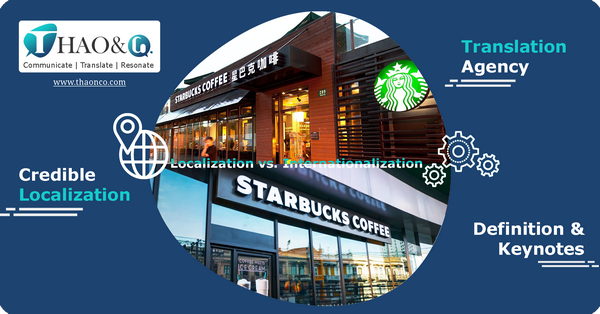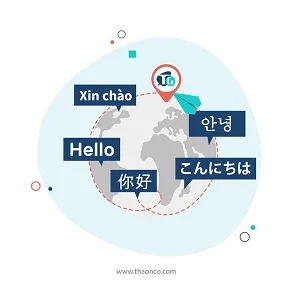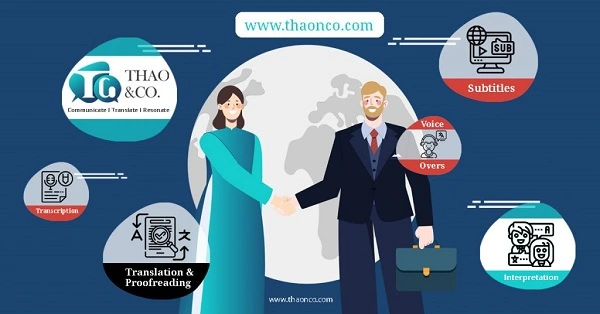Localization and Internationalization are two important concepts that businesses must be familiar with to effectively expand and infiltrate the international market. The article below will help you firmly grasp the differences between localization and internationalization.
Internationalization is the process to modify and prepare a product, service, or system so that it meets international standards. It aims to pave a smooth path for businesses to infiltrate new markets and interact with global customers and partners.
The internationalization process includes modifying details such as language, date format, measurement units, symbols, user interface, etc. so that it meets international standards and regulations. In other words, the main objective of internationalization is to create a new version of a product that can be introduced into any market without significant modifications.
Internationalization does not stop at translation, it also ensures that the product is culturally relevant and displayed correctly. Internationalization helps businesses approach potential customers on a global scale, significantly enhancing their competitiveness.
McDonald’s has long created a standard menu for the international market, which includes Hamburger, Cheeseburger, McNuggets, and Big Mac. There is consistency in their recipes, which helps to ensure that customers can find their favorite meal readily available in all countries with McDonald’s presence. Whether it’s in the USA, Japan, or Brazil, McDonald’s stores can be easily spotted thanks to their iconic color combination of red and yellow in both the McDonald’s logo and interior arrangements.
The company also launched numerous global marketing campaigns to boost brand awareness and connect with its customers across the world. For example, Ronald McDonald and his instantly recognizable line “I’m Lovin’ it” has become a symbol for the brand and is regularly used in TV advertisements, news, and social platforms. This helped McDonald’s build a unifying brand image that stands out.
Localization is the process of adjusting a product, service or content, making it suitable for a specific language, culture or market. It aims to create a different version of a product that meets the preferences as well as requirements of the local market and consumers. Translation services can help businesses preserve the message and value of a product while making it accessible to more people.
The newer and localized version should feel natural for local customers to interact with and use. Localization will help to enhance the customer experience and create a connection between your product and the local market.
When Starbucks entered China, they translated their names and came up with new terms for their products. For example, instead of introducing themselves as Starbucks, their original name, they created a Chinese version of it called “星巴克” (Xīngbākè).
The company also created a special menu specifically for China. They took into account local preferences and included popular drinks such as milk tea and bubble tea. They also introduced snacks and dumplings made to Chinese appetites.
Starbucks also designed its coffee shops in Chinese style. The interior designs were inspired by Chinese architecture, and they created a comfortable and homey feel, which is perfect for hanging out with friends.

There is a deep contrast between localization vs. internationalization when it comes to intentions. Localization strategy aims to deliver a familiar experience to a specific market by creating products or services that are culturally and linguistically relevant based on local preferences without violating the target country’s regulations. In doing so, businesses can increase their chance of successfully penetrating a market and cementing their position in the area.
The purpose of internationalization is to create a product or service that is fit to be launched in multiple markets without significant changes. This helps make it compatible with many languages, cultures, and countries. Internationalization allows businesses to simultaneously and effectively establish their presence in different markets.
Localization and internationalization can differ in many aspects. The localization process focuses on adapting a product or service to a specific market. The first step is usually doing market research to gain better insights into the lifestyle and shopping habits of local customers. The next step would be adapting the content, making it linguistically, culturally, and legally suitable for that specific market.
On the other hand, internationalization revolves around designing and developing products that can be introduced into many countries. The internationalization process would start with designing and developing products in a way that makes them easily welcomed by many markets. Internationalization relies on development standards and strategies that are not dependent on any particular language.
Localization and internationalization can affect a business in many ways. To elaborate, localization helps deliver a familiar experience tailored to local preferences. Adapting to the spoken language and other cultural factors will make customers feel as if the product were specifically made for them. This in turn allows for positive interactions and reinforces customer loyalty.
Additionally, localization plays a vital role in eliminating language and cultural barriers, helping customers have a more pleasant experience when using a product or service. In other words, localization provides the means for customers to access and enjoy a product or service.
On the other hand, internationalization creates a multicultural and multilingual experience, drawing in customers from all over the world. The product will no longer be perceived as foreign by local consumers due to differences in the language and culture. On top of that, internationalization also helps to maintain consistency in user experience across different countries.

Localization and internationalization are necessary when you wish to enter new markets and expand your business internationally. Localization offers superb user experience tailored for a specific local market while internationalization streamlines a product or service for multiple markets across the world.
An effective combination of localization and internationalization is crucial for market expansion and business growth. Your products or services will be customized to the preferences of local customers, giving you the edge over rival companies in the global market. This will also allow your company to build an efficient, productive, and economical production line, boosting sales and brand awareness.
Many companies such as McDonald’s, Coca-Cola, Unilever, Adidas, etc. have successfully utilized both localization and internationalization in their business strategies. A keynote to consider when attempting to infiltrate a new market is to understand the needs and requirements of target customers. Additionally, you will have to raise global brand awareness and double down on connecting with customers across the world.
Through this article, we hope that you now have the necessary information to differentiate localization from internationalization so as to establish realistic objectives and select the most suitable translation agency. The issue of finding the ideal localization agency depends on the nature of your project as well as your company’s field of operation. The best agency is the one that can meet your requirements and deliver superior results in a timely manner.
Are you looking for a professional translation and localization agency? Thao & Co. is one of the top companies in the localization field, providing localization service in multiple languages for a variety of industries. On top of that, Thao & Co. has many years of experience in conducting business with multinational companies and invests in the latest technology to help companies successfully execute their campaigns and achieve business goals.

Should you need to launch an app, software or game on the international market, or build a website that can draw in consumers from across the world, the linguistic experts at Thao & Co. will help you deliver the greatest user experience. Your products and services will then be universally well-received, bringing in more sales and increasing the company’s impact on a global scale.
To receive a free consultation, visit our Get a Quote page. Additionally, you can find further information on our localization services at: https://thaonco.com/app-software-website-game-translation/